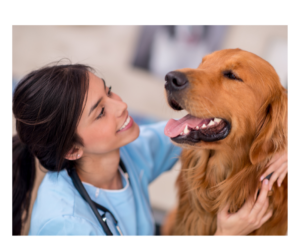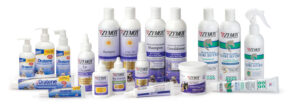New Beginnings: Caring For Your New Pet

By Carol Bryant, Professional Pet Blogger
If you’ve welcomed a new pet into your life, congratulations! The journey of a pet parent is exciting, rewarding, and one of the most fulfilling ways to give and receive unconditional love. Whether you’re a first-time pet parent or adding another animal to your pack, this blog post will provide valuable insights, practical hands-on tips, and a getting-started list to ensure a smooth start. It takes about three weeks for most pets, including dogs, cats, birds, and reptiles, to adjust to a new home. That timeframe can vary if your pet is a rescue or has any pre-existing conditions.
Promise yourself three things to coincide with those three weeks of adjustment:
- You will exercise patience.
- You will consider the pet a part of your family.
- You will provide a lifetime of care, love, and respect for the pet.
Now that your pet is a permanent part of your home and heart, here’s what to do in those first several weeks.
Visit the Veterinarian
Make an appointment for your pet to have a thorough checkup with a veterinarian. Ideally, you want to do this within the first week. Your veterinarian will be your pet’s second best friend, so ask any questions you may have. The vet can advise you of the proper vaccination protocol, blood work schedule, dietary needs, and perform a hands-on examination.
advise you of the proper vaccination protocol, blood work schedule, dietary needs, and perform a hands-on examination.
Establish a Routine
Get everyone in the family on board with the new normal. Adding a pet to the family means consistency with rules. Assigning responsibilities to family members can help them bond with the new pet and instill a sense of commitment and responsibility. If you live alone, set up a routine you plan to follow. For example, when your pet will go outside for potty breaks, when the cage gets cleaned, what time feedings will occur, exercise schedule, where they will sleep, etc.
Observe Behaviors and React or Adapt
One of the best things you can do for your pet is to keep a close eye on them. Don’t overwhelm your pet and allow them supervised exploration. Pay attention to their body language and things they do and do not enjoy eating or doing. Keep watch of their eating and drinking habits, as too much or too little may indicate health issues. Observe how your pet interacts with family members, strangers, and other animals. Learn to read your pet’s cues to be one step ahead if something bothers them.
PRO TIP: An indoor pet security camera provides peace of mind so you can watch your dog, cat, lizard, bird, fish, or any pet while you are out or in another room.
Establish A Baseline Normal
Knowing what is normal in your pet will serve you well throughout the animal’s lifetime. Pets can’t tell us when something hurts or they don’t feel well. Knowing what is ‘baseline’ becomes a reference point against which you can compare anything out of the ordinary.
This includes:
- Monitor eating and drinking habits
- Noting sleeping patterns
- Assessing energy levels
- Tracking potty habits and what it looks like
- Noting your pet’s skin and coat
- Keeping track of oral and ear baselines
Pet First Aid Kit and Emergency Basics
Have your veterinarian show you some basic things you can do should your pet become injured and require transport. Our blog post, Tips, Tricks, and Tactics to Render Aid To Injured Pets, will give you a really solid overview. There are some essential products to have ready at all times. This includes:
- A fully stocked pet first aid kit dedicated to that species (i.e., dog, cat, turtle, horse)
- Pet carrier or crate
- Emergency blanket
- Muzzle (many pets will snap or bite in pain)
- Eye wash solution
ZYMOX® Must-Have Products By Species:
Dogs and Cats
- ZYMOX Ear Cleanser: Gently soothes and cleans dirty ears
- Oratene Enzymatic Brushless Oral Gel: Supports normal periodontal health and gum tissue health
Reptiles
- Zylafen Topical Solution: Relieves irritated, itchy skin and cuts in lizards, snakes, and turtles
Horses
- ZYMOX Equine Defense Enzyme Formula: Topical spray for equine wounds, abrasions, cuts, girth sores, and irritations
Birds
- ZYMOX Avian Care Topical Solution for All Birds: Supports healthy skin and plumage and helps soothe irritated skin due to abrasions, wounds, molting, and feather plucking in all birds, including poultry and waterfowl.
Small Animals and Exotics
- ZYMOX Small Animal & Exotic Topical Spray: This product supports healthy skin and helps to soothe infected or irritated skin, cuts, and abrasions in small and exotic mammals such as rabbits, guinea pigs, hamsters, mice, rats, ferrets, monkeys, hedgehogs, chinchillas and more.
In review, here are the top 10 things every new pet parent should do when bringing a new pet home:
- Have your new pet examined by a veterinarian
- Establish a routine
- Create a regular feeding schedule
- Set regular play, walk, and training/socialization time
- Observe your pet’s behavior and adapt routines as needed
- Spend quality time together
- Establish a baseline ‘normal’
- Emergency preparation items
- Have a pet first aid kit and essentials handy
- Journal your pet’s progress
Here’s to your new pet and a long, happy, healthy life!
About the Author

Gayle King introduced Carol Bryant as a “dog lover of the highest order” when she and her Cocker Spaniel, Dexter, appeared on Oprah Radio. Carol is well-known in the pet industry, having appeared on television, radio shows, and podcasts, as well as in articles from CNN and Yahoo to Dogster and Today.com. She is the founder of the award-winning blog FidoseofReality.com and is the Immediate Past President of the Dog Writers Association of America.

